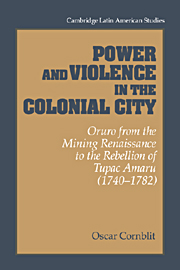 Power and Violence in the Colonial City
Power and Violence in the Colonial City Book contents
- Frontmatter
- Contents
- List of figure, maps, and tables
- Preface
- Map 1 Present-day Bolivia and surrounds
- Map 2 Principal routes of the Viceroyalty of Peru (second half of the eighteenth century)
- 1 Oruro between two epochs: a mining cycle
- 2 Under Spanish law
- 3 Oruro in 1741: details of a stormy election
- 4 The people
- 5 “Madmen, comedians, and hypocrites”
- 6 Captains of shipwreck
- 7 Returning to the known
- 8 “The fruits of the earth”
- 9 The end of an epoch: the Indian uprisings of 1780–1781
- 10 Oruro in the economic and geopolitical context of the epoch (c. 1780–1781)
- 11 The Oruro uprising
- 12 The voice of the rebels
- 13 Picking up the pieces
- Appendix A Indian raids on Oruro, 1781: testimonies
- Appendix B Testimonies of inhabitants of the city
- Appendix C Table of public jobs in Oruro, 1730–1784
- Bibliography
- Index
- CAMBRIDGE LATIN AMERICAN STUDIES
6 - Captains of shipwreck
Published online by Cambridge University Press: 30 March 2010
- Frontmatter
- Contents
- List of figure, maps, and tables
- Preface
- Map 1 Present-day Bolivia and surrounds
- Map 2 Principal routes of the Viceroyalty of Peru (second half of the eighteenth century)
- 1 Oruro between two epochs: a mining cycle
- 2 Under Spanish law
- 3 Oruro in 1741: details of a stormy election
- 4 The people
- 5 “Madmen, comedians, and hypocrites”
- 6 Captains of shipwreck
- 7 Returning to the known
- 8 “The fruits of the earth”
- 9 The end of an epoch: the Indian uprisings of 1780–1781
- 10 Oruro in the economic and geopolitical context of the epoch (c. 1780–1781)
- 11 The Oruro uprising
- 12 The voice of the rebels
- 13 Picking up the pieces
- Appendix A Indian raids on Oruro, 1781: testimonies
- Appendix B Testimonies of inhabitants of the city
- Appendix C Table of public jobs in Oruro, 1730–1784
- Bibliography
- Index
- CAMBRIDGE LATIN AMERICAN STUDIES
Summary
After the death of the corregidor Martín de Mier y Teran at the beginning of 1746, the audiencia at Charcas – in another demonstration of sympathy toward the Herrera family – named as interim corregidor the son of Don Melchor, Manuel de Herrera. In spite of the personal intervention of the viceroy in the election of alcaldes that year, there was still an angry mood in the town. The naming of Herrera's son as interim corregidor probably added to the defeat felt by his opponents, again raising the temperature of the confrontation in the city to intolerable levels. Although copies of all the letters that each faction sent to the viceroy have not been preserved – letters endorsing their own side and denigrating their opponents – Manso de Velazco's replies indicate that he was wavering, by this time, between boredom and indignation. Persuaded that the time had come to act harshly, the viceroy decided to stop listening to arguments from the two sides – and probably also to the advice of the audiencia in Charcas – and make independent decisions.
He began by sending a letter of admonition to the members of the cabildo, in which he said, “I cannot find words adequate to express the extreme extent to which my just displeasure extends.” Considering that “this hotheaded disorder ignited by your hateful rivalries has lasted a long time” he added that he was considering using all the means at his disposal to placate the high-handed behavior ruling the town.
- Type
- Chapter
- Information
- Power and Violence in the Colonial CityOruro from the Mining Renaissance to the Rebellion of Tupac Amaru (1740–1782), pp. 72 - 80Publisher: Cambridge University PressPrint publication year: 1995


